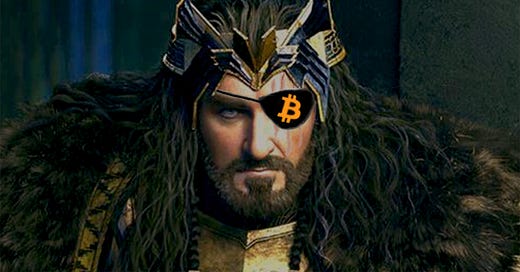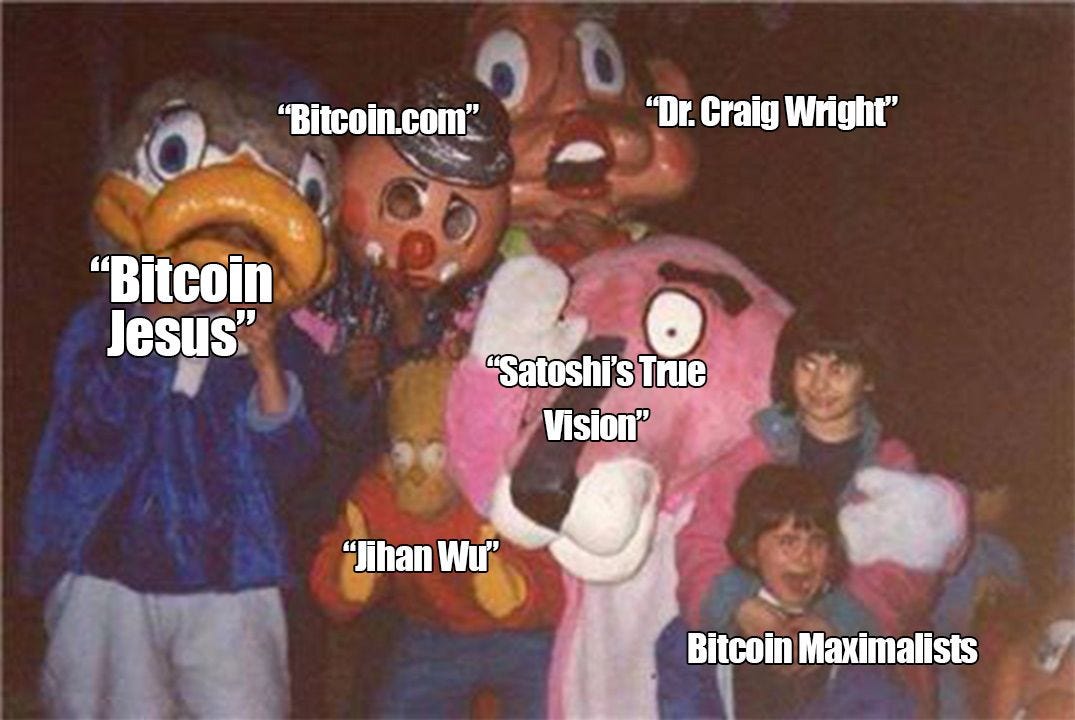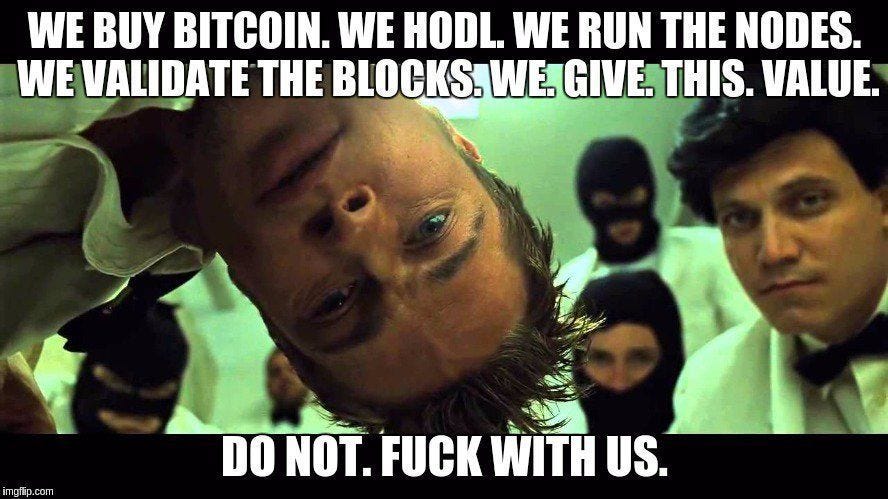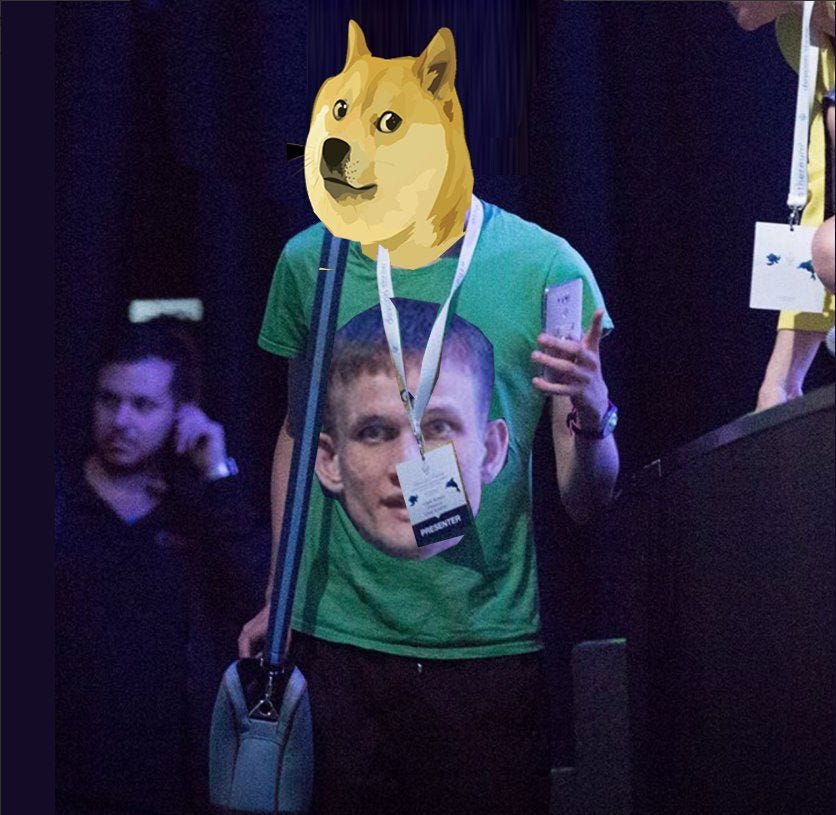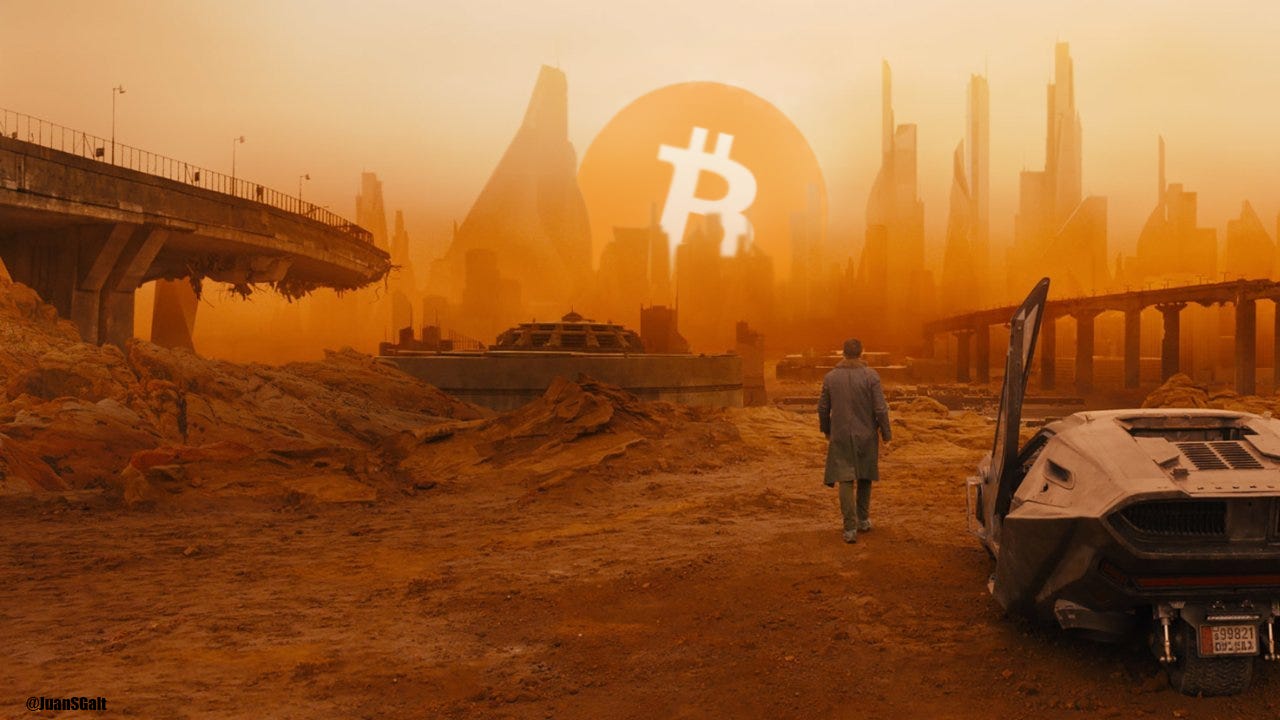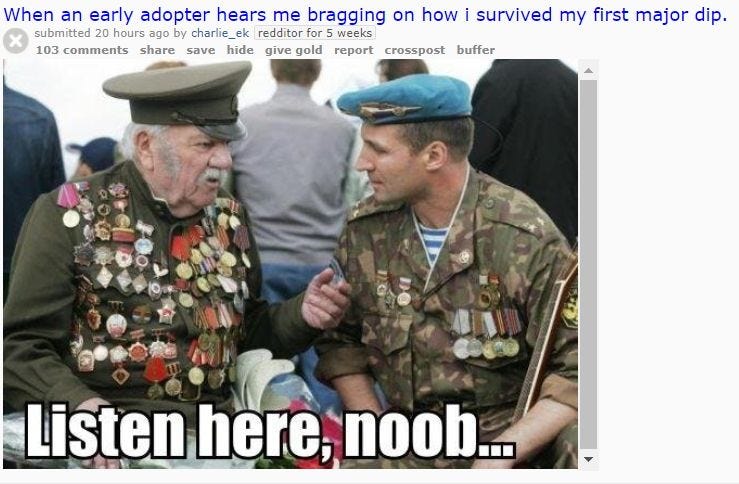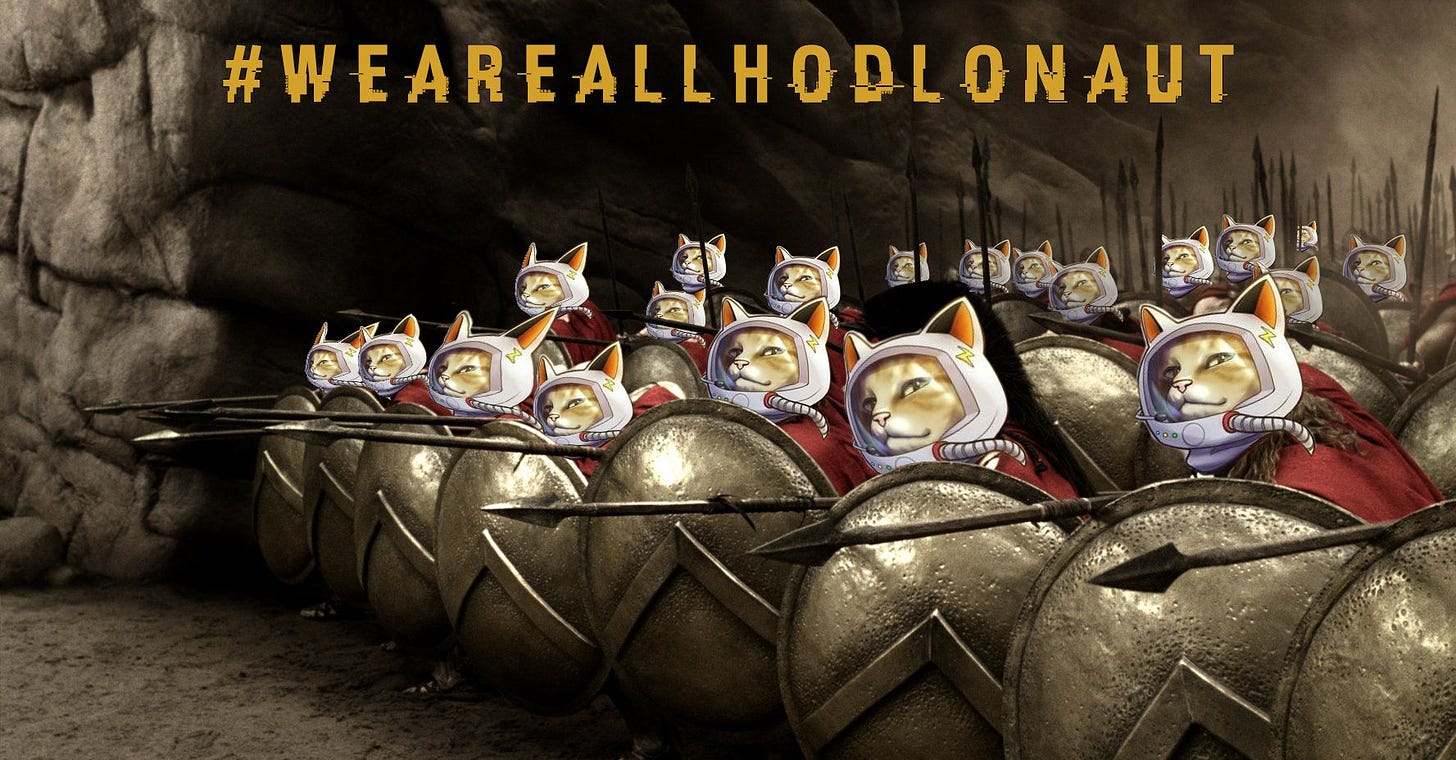The Scams vs Toxicity Dilemma in Bitcoin
A debate is raging lately (on crypto twatter) about "Bitcoin maximalist toxicity". Kind of a lame topic, I know. But there's some important questions being raised.
Why we are toxic
A debate is raging lately (on crypto twatter) about "Bitcoin maximalist toxicity".
Kind of a lame topic, I know. But there's some important questions being raised.
As an active contributor to this class of Bitcoin shitposters, I can tell you my reactive defensiveness does indeed come from experience.
It comes from hearing the same old ignorant critiques of Bitcoin I've heard since the media discovered Bitcoin.
It comes from an endless stream of new crypto 'currencies' and their premine funded marketing teams claiming they 'are better than Bitcoin' because they changed some parameters that have no fundamental impact. Or because they are 'faster' when their settlement finality and security is actually much weaker.
It comes from the ten-thousandth Bitcoin obituary written with glee. It comes from the retail facing investment shows, pumping and dumping coins on retail, probably backed by Wallstreet whales.
It comes from a profound propaganda level attack on Bitcoin about Satoshi's true intentions, that tried to split the community and lead to multiple forks. Most of which were blatant scams.
It comes (often enough) from actually having been burned by shitcoins. By techno bureaucratic blockchain processes, by exist scams, rug pulls, hacks, forks, and shitty virus laden wallets.
It comes from the "blockchain not Bitcoin" bullshit that bankers came up with to divert attention from the real innovation.
It comes from the thousandth pump and dump that turns out our friend from highschool is really into. Or that random family member that got 'into crypto' and won't stop asking "What do you think about [Insert shitcoin here]?".
It comes from the recognition that maybe soon, on average, our frens, fam and noobs worldwide will get burned. Even if that's the only way they are going to learn their lesson. Even if they have a sense of the risks that they are taking.
It comes from actually knowing people that believed in Bitconnect and lost too much.
We, the toxic maximalists, are the byproduct of the crypto industry's misaligned incentives.
We are the product of their unchecked greed.
We are those who remember crypto's dark side.
Is it a wonder we shit post?
Our confidence also comes from believing that Bitcoin would thrive, and being damn right. Despite all the 'experts' and talking heads telling us it would fail.
Without political power and without centralized control, our voices and personal influence collectively are what has pushed back on that establishment.
A nepotist establishment that naturally seeks to protect its own power, as they drink deep from the titty of the FED.
An establishment that understands enough economics to do damage and refuses to acknowledge freedom technology or thought.
We are those who remember fiat's dark side.
That said.
While we have become quite good at expressing our contempt & disbelief for the political elitists and the academic idiots. For the corporate crypto money grabs and the most obvious of all scammers.
A question does remain...
The Dark Side Of Toxicity & The Blind King?
Victory and experience do not come without risks, dangers or temptations, no matter the endeavor.
Success is a blessing, and it naturally feeds our confidence. But too much confidence can become arrogance. And arrogance is a kind of blindness.
I'm not saying Bitcoin isn't king for good reasons. Or that it's reign won't last a thousand years. I think it will, it could, it just might. I am a believer.
What it does mean is that it might be arrogant of us to think that Bitcoin is the only asset class to be born from this invention. From this discovery.
Or that "everything but Bitcoin is a scam" is more than just a meme, some kind of principle of nature.
You want examples? fine, Namecoin, Monero. Idk, someone mentioned Siacoin and Grin. Have you looked at everything invented by the shitcoiners? I have not.
And I've looked at a lot.
Maybe NFTs? who knows. That's the point.
Unless our attention combs through everything. Or unless we categorically determine that certain things can only be scams, then our knee jerk reaction to condemn other crypto things can actually be inaccurate, even if it's statistically on point.
In other words, while most things in crypto probably won't last. While too many things in crypto are indeed scams. Some are not. And the blind king can not tell the difference.
Indeed the blind king sorta doesn't care. The blind king assumes he knows what is in front of him, based on the outline, the sound, the smell. But can't really give it his full attention as he believes he's seen it all, and has no time to dig deep into every little thing.
The king is blind by bitter experience and a thousand examples of disappointment.
The blind king assumes this 'new thing' is just more of the same.
That's why the establishment doesn't get us. That's why the academic idiots misunderstand us. That's both our strength and their blindness. And our potential future weakness.
Does that makes sense? Do you see the edge case I'm pointing out? It may be that 'Bitcoin fixes everything' including this. But of that I'm not convinced.
While I do not want to demolish maximalist confidence, nor could I if I tried. Here's some questions that will make us better leaders as we transform into the new economic elite.
Are we succumbing to group think? Out of a desire to be accepted by our peers?
Has "everything but Bitcoin is a scam" become more than a meme? A totality ideology that crushes nuance and innovation?
Are we losing the intellectual curiosity, diversity of thought and integrity of speech that probably brought us here?
Have we trained the new generation of Bitcoiners to simply close their eyes to what the rest of the industry is doing, because "they are trying to scam you for your bitcoin" or something like that, that's probably but not always true?
Have we trained a new generation of Bitcoiners to not shitcoin in part through social enforcement instilling in them a fear of ostracism?
I understand I'm using the 'we' and 'us' very liberally here. These are not accusations but questions that no one else probably ever asked themselves in any movement or in any ascension to 'power'.
But that is why we are better. Why we should be better. It is being better that is the point after all, is it not?
Is Toxicity Effective?
Now we do have to ask the obvious question. Has our scorn towards the various obvious excesses of the 'crypto industry' actually been effective? Who benefits from our silence?
I'd say there's actually quite a bit of evidence that progress has been made. And maybe we had an important role in that.
Altcoins Are Ded
Altcoins and competing 'crypto currencies' for the most part died in the bear market of 2014. While many of them are still on coinmarket cap, what is their relevance? As a whole, they simply continue to lose value or have stagnated.
Even worse, probably 10 thousand shitcoins have straight up disappeared, deleted from coinmarketcap.com. If there is such a thing as death in shitcoin land it is probably being considered not worth listing by CMC.
ICOs Are Way Too Scammy
ICOs were next and boy did they stoop a lot of people. 2017 was the season of ICO scams, with a thousand projects being funded and none bearing fruit? Did anything actually become a useful product thanks to an ICO? Did anything come to market?
I think I might have seen a few examples. a handful perhaps, whose names I can not remember.
Yeah sure, 90%+ of start ups fail (or more). But no failed start ups in history have ever been so successful either!
The amount of money made by fly-by projects with shiny websites in 2017 is probably too absurd to even guess.
I think we can all agree that flooding a bunch of ambitious kids with tons of money kills motivation. In particular before they've built anything or developed their discipline and habits of production and creation.
Maybe some ICOs produced something useful. I can probably come up with some examples if I try hard, but they would certainly be the exception.
Now it's the 2021 bull run and this time around we got 'DeFi' and NFTs going nuts.
How decentralized is 'DeFi' really?
How many defi projects will last? how many have already been hacked? how many will go under? how many will become something long lasting?
How many have admin keys. held by their developers. Making them more CeFi than DeFi?
I'll be honest, I've yet to give enough fucks about defi to give it a proper test. As far as I can tell it's ponzi schemes all the way down.
They don't even pretend to have a product. I've not heard much ambition or aim to change the world from them. They call it decentralized but how often is this just in name?
It seems most of DeFi is just an attempt at improving 'number go up technology' even if just for a little while.
Maybe I'm wrong about that, maybe there's some exceptions. Maybe some will develop actually useful lending markets that can do what banks once did, provide capital to capitalism. Again I have not looked carefully, or seen such a thing yet. And I think I'll let time be the judge.
Right-click-save that shit bro.
NFTs? Well, to be quite honest. I've been doing a lot of thinking about NFTs the past few months, and I've known about them for a long time. I actually created one of the first NFTs years ago back when they were worthless and we were just fucking around.
So I have a lot to say about NFTs and if I got into it right now it would take over this article. So for now I'll say that, I do not believe NFTs are a scam as an asset class, but there's gonna be a lot of shitty art and money grab NFTs coming our way in the coming months and years.
Progress
My point with this whole tirade is that, we've actually made progress. The scams of the past have transformed and have shed their cringy narratives of great ambition, potential and societal transformation. They are down from 'decentralize all the things' to something like 'hard to regulate gambling' and collectibles.
And that, ladies and gentlemen, is progress. While our condemnation of many of these excesses of crypto's past has probably had an impact, at least in defending Bitcoin's name. Their own economic fate settled the deal. And perhaps we helped, by calling out the bullshit as it came and letting time do its thing.
We can probably expect that to continue.
Where the market remains irrational for long, like BSV, or Bitconnect. There we should continue to righteously condemn the scams and shitcoins. Though perhaps we can take it as an opportunity to educate the huddled masses about why Ponzi schemes are doomed to fail.
And that is really what I'm trying to get at. Can we be more effective? Are we wasting opportunities to educate the noobs?
The Asymmetries Of Truth And Lies
Ahh, there's the rub.
Lies that are convenient to your narrative are a lot cheaper to create than it is cheap to dispel them with truth.
The truth takes time, it takes thoughtfulness, it takes context and comparative analysis.
The truth demands that an audience understand certain fundamentals, axioms and concepts.
The truth is actually hard to get to, although not impossible.
And that's the problem of our age really, it is not just a thing of crypto.
Even if you are not trying to sell a scam to the public. Even if you are an honest company with an honest product or solution to a real problem, what ever industry you are in, there's only so much room for messaging in an advertisement. There's only so much detail you can fit in a meme.
The truth takes time to discover, time to communicate, time to consume and time to comprehend.
So even in the best of cases, communicators are going to have to trim the edges, remove some nuance and simplify messaging so that they can peak the interest of the public and hopefully lead them down some tailored rabbit hole.
When it comes to 'crypto', those of us who have experienced the bullshit behind the marketing have quite a challenge. We have to fend off the sponsored marketing teams of shitcoin projects who can promise early investors outsize returns for an initial marketing (and sometimes development) budget.
They get paid to build a narrative and deploy it at scale through the known marketing channels.
And us? the skeptics? Well. No one is paying us to talk shit on twitter, so of course, the resolution of some of our counterarguments out there can be pretty low, even when hilarious. There are excellent exceptions to this rule.
In fact, some of the most popular people on bitcoin twitter are those who have done deep analysis of these topics. There is a market there for nuance and truth.
Some people that come to mind who take this approach:
Nic Carter
Tone's 'crypto scam podcast' has done some good work here.
Jimmy Song of course
Alex Gladstein
And that is I think what we should strive for when possible. Patient deconstruction of marketing fluff and explanation of fundamentals.
And of course, memes. Lots and lots of memes.
Memes Rule The World
In no way shape or form am I suggesting that we should stop being funny. Bitcoin memes are some of the best things that ever happened.
People come for the money and stay for the memes and we want to keep it that way. Good memerie, good art demand of us a certain lack of fucks. You kind of have to not care about other people's feelings to much for your memes to really hit.
And that's ok, people are gonna cry, let them cry harder.
Some will never believe, let them have fun staying put.
My point is not so much that we should stop having fun, but rather that we should be aware of how little people actually know about Bitcoin and crypto.
And that we are prepared to back our trolls, memes and shitposts with hard, cold nuance.
And there it is, that's my point.
-THE END-


